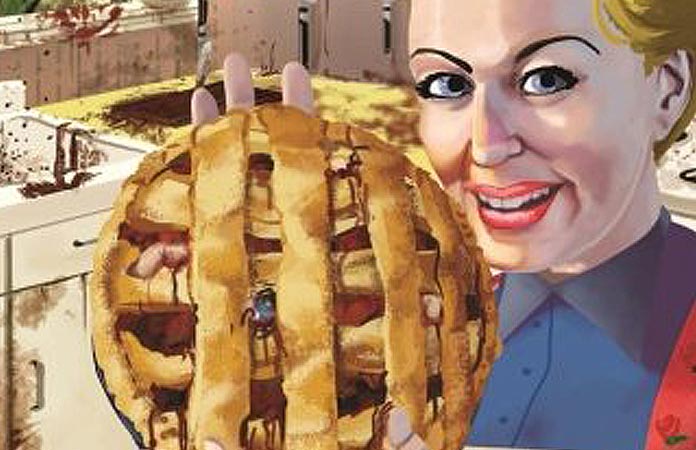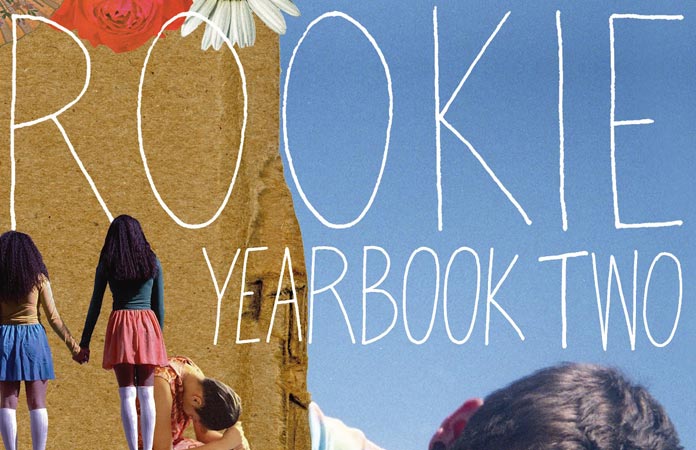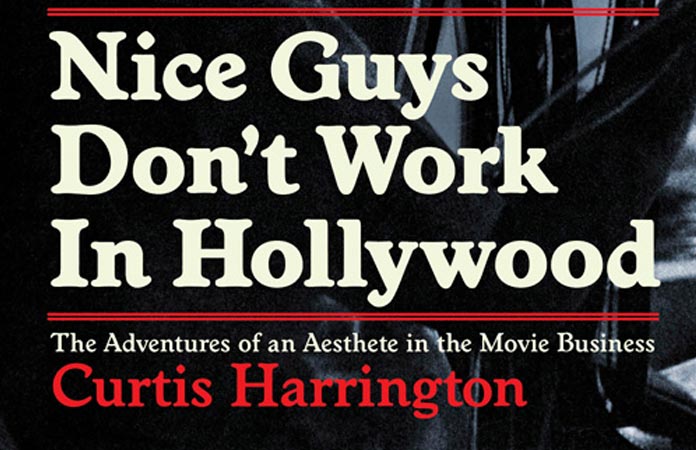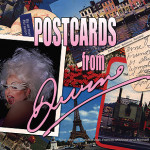Book Review: Comfort Foods: This Ain’t Your Momma’s Cooking!
Published on October 21st, 2013 in: Book Reviews, Books, Current Faves, Horror, Reviews |October is here! And just in time for Halloween, the Nashville Writer’s Group presents Comfort Foods, a horror anthology edited by Nashville author Nikki Nelson-Hicks. The collection includes 13 short stories from local writers, many of which have distinctly Southern, if not uniquely Nashville, flavor to them. Some of these tales offer new takes on classic chills such as ghosts or zombies, and others invent entirely new nightmares for the reader.
Book Review: Rookie Yearbook Two
Published on October 8th, 2013 in: Book Reviews, Books, Current Faves, Feminism, LGBTQ, Teh Sex |If ever there was a website that required a print counterpart, that website would be Rookie. The smart, bracingly honest site founded by wunderkind Tavi Gevinson has in part made its name on its gorgeous photography, endearing handwritten content, kaleidoscopic collages, and lovingly curated vintage images.
Holding Rookie Yearbook Two between the palms of your hands and idly flipping through its pages is a satisfying experience. The opening and closing papers contain autographs from some of Rookie’s bold-faced friends and contributors, like comedienne Julie Klausner, photographer Autumn de Wilde, and punk rock renaissance woman Carrie Brownstein; the book is printed on heavy matte-finish vellum paper, and the shifting, girly page backgrounds of quilts and textiles gives the book an inviting appearance. Tavi and her colleagues even included some pages to rip out, like a mini-tarot deck of photos from a photo shoot and a foldout of stickers for a build-your-own-shrine feature.
Writing this much about the appearance of a book—down to the card stock pages on which it was printed—might sound a note of foreboding that the images might outshine the words. Nothing could be further from the truth. Though Rookie’s graphic design, online and in print, will enchant readers, the content will engage them past the first glimmers of glamour.
Book Review: Nice Guys Don’t Work in Hollywood, By Curtis Harrington
Published on July 11th, 2013 in: Book Reviews, Books, Current Faves, Movies |Before Guy Maddin, there was Curtis Harrington. Like Maddin, Harrington made byzantine features that served as a love letter to early cinema at a time when it was mildly unfashionable to do so. He frequently cast dwarf actors and other nontraditional talents alongside the kinds of grandes dames that Hollywood forgot. His films incorporated outmoded narrative and technical elements that, when used well, could hypnotize audiences. Unlike Maddin, who is recognized by his peers as a true visionary, Harrington had worked his way through the studios during the New Hollywood era, when the kind of work he was doing was on its way out, and he never got the recognition he quite deserved.
Harrington’s posthumously published memoir Nice Guys Don’t Work in Hollywood reads a bit like history as told from the perspective of someone who had the talent and drive but not the aesthetic. Though Harrington would hate the phrase “lovable loser,” his point of view and self-deprecating sense of humor mitigate any pity one might feel towards his series of near misses.
Book Review: Zombie Eye For The Living Guy: Look Undead, Cook Undead, Dress Undead, and Live Undead
Published on October 25th, 2012 in: Book Reviews, Books, Comedy, Halloween, Horror, Reviews |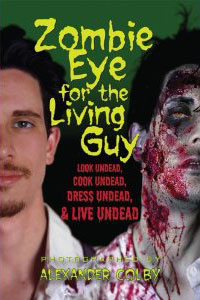
In a world where The Walking Dead is one of the most successful TV programs on the air, where politics shambles on brainlessly, and it seems that the end times are nigh, why wouldn’t you want to dress like it’s Halloween? If you live for the absurd and obscene, there is at last a lifestyle book for you and your peers. This black-hearted parody of the best-selling Queer Eye for the Straight Guy tie-in books brings an undead perspective to the perennial challenge of living well, looking good—or, in this case, horrible&mdash’and being exactly the decaying, mindless flesh eater you’ve always wanted to be.
For those who have read the Queer Eye book, the parody is dead-on and hilarious. With sections titled such things as “Inner Preparations,” “Should I Eat Human Brains?” and “Social Skills,” every aspect of the gruesome, yet satisfying world of being a walking abomination is addressed with wit, variety, and a very silly thoroughness. Yet this is not just a point-by-point parody; Zombie Eye also contains quite a few pointers to enrich and enliven (so to speak) any good zombie costume for those still breathing.
Book Review: The Minus Times Collected
Published on October 3rd, 2012 in: Book Reviews, Books, Comedy, Reviews |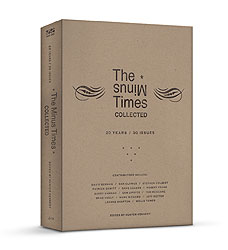
What is it like to take a time machine back to a time when I was a burgeoning sarcastic twenty-something with a tendency to sneer and a sense of humor as black as it comes? The recent Minus Times Collected, lovingly assembled for its 20th anniversary, is a portal to that time, for me at least. Is it a place I want to be, though?
When confronted with work like this—a relic full of irony for irony’s sake that creates a critical distance on purpose—it only brings out my ponderous side. By definition, isn’t nostalgia supposed to create a sense of wistfulness and yearning? Sure, I like a thumb in my eye when the humor feels earned, and I realize that this style should be different because it isn’t meant to feel cozy and warm. When I looked back at this wicked side of this particular collection it only served to make me realize that there are other and better time capsules, ones that are consistent and head and shoulders above this in quality.
Book Review: The Wrong Word Dictionary
Published on September 27th, 2012 in: Book Reviews, Books, Reviews |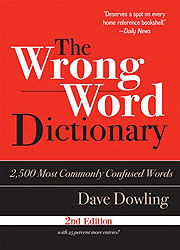
Are you one of those people that flies into a laser-eyed rage when you see grizzly misused in the place of grisly? Or are you one of those people who has no idea what the difference is between a gourmand and a gourmet; all you know is that they love their food or something? The English language is a tangly beast, easy to give the impression of mastery for any native speaker, and yet almost no one, even linguists, editors, professors of English, or journalists writing in the New York Times (ahem) will always choose the correct word, sometimes using an incorrect homonym or a related word, and only the driest (or perhaps the most frothy) pedants ever seems to notice.
Book Review: Raising Hell: Ken Russell And The Unmaking Of The Devils By Richard Crouse
Published on September 24th, 2012 in: Book Reviews, Books, Current Faves, Movies, Underground/Cult |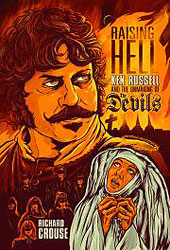
If you live in or around Toronto, Ontario, Canada and you like movies, then you’ve already heard of Richard Crouse. For the rest of you, he’s a Toronto-based film critic and TV personality, who can be seen on both Canada AM and CTV’s 24-hour news channel (as well as at nearly every film event and festival in the Toronto area). Most importantly:, he’s also a tremendous, lifelong fan of filmmaker Ken Russell.
Crouse’s latest book (he’s written six others) is all about Ken “Enfant Terrible” Russell’s most controversial and frequently misunderstood 1971 film The Devils, starring Oliver Reed and Vanessa Redgrave. Raising Hell: Ken Russell and the Unmaking of The Devils begins much like my own recent reintroduction to Ken Russell: a prologue detailing Crouse’s 2010 meeting and interview with Russell in conjunction with Rue Morgue’s Festival of Fear screening of The Devils.
Letters To Kurt by Eric Erlandson
Published on April 8th, 2012 in: Book Reviews, Books, Music, Reviews |By Emily Carney

Whether you liked Nirvana or not, if you grew up in the 1990s, your cultural map was dotted with the band’s landmark accomplishments. I vividly remember the debut of Nevermind in 1991, the Sassy magazine with Kurtney on the cover (Kurt Cobain had pink hair and he and Courtney Love both looked like elegant street urchins), the band’s MTV Unplugged, Kurt’s first horrifying suicide attempt in Rome (my best friend told me about it the morning it happened at the bus stop—we had just turned 16), and the world premiere of Hole’s “Miss World” video about a week later.
Then April 8, 1994 swung by. Along with it, the awful news of Kurt Cobain’s suicide by gun. My best friend again called my house after school and told me authorities thought they’d found Kurt’s body in his house. Of course, that nomenclature is never good. Even though I was not a super-fan, I was genuinely saddened by the awful manner of Kurt’s demise. The grief was only exacerbated two months later by the overdose death of Hole’s bassist, the beautiful, gifted Kristen Pfaff. It felt, genuinely, like all of my era’s talents were being plucked off, one by one.
(more…)
Postcards From Divine, by Noah Brodie, Dan Marshall, and Michael O’Quinn
Published on February 7th, 2012 in: Book Reviews, Books, LGBTQ, Reviews, Underground/Cult |By Eric Weber
In John Waters’ book, Shock Value (1981) he writes:
“The oddest question I ever get from college students is ‘Do you have parents?’ The first time I heard this, I was shocked. Did they think somebody found me under a rock and dragged me home? What person in his right mind would clone me, I wonder. ‘Everyone has parents, ‘ I tell them. ‘Even Lee Harvey Oswald had a great mother.’ I guess by this question they are tactfully trying to ask, ‘What on earth could your parents think of you?’ and this I can see, because whenever I read about some lunatic I admire, this question is the first thing that pops into my mind.”
One could easily imagine this question being asked of Divine—the late, great character actor who rose to fame as the female star of several of John Waters’ films. From Mondo Trasho (1969) to Hairspray (1988), Divine played a gamut of roles that ranged from deranged model (Female Trouble, 1974) to loving mother (Polyester, 1981). Divine became so associated with his over-the-top female characters, that many felt that he was in fact authentically female and lived up to his moniker, “The Filthiest Person Alive”—a title his character earned in the notorious Pink Flamingos (1972).
(more…)
Forbidden Fruit: Banned, Censored, and Challenged Books from Dante to Harry Potter
Published on January 30th, 2012 in: Book Reviews, Books, Canadian Content, Issues, Oh No You Didn't |When you think of banned books, you might think of Henry Miler’s Tropic of Cancer (1934), J.D. Salinger’s The Catcher In The Rye (1951), Kurt Vonnegut’s Slaughterhouse Five (1969), or Margaret Atwood’s The Handmaid’s Tale (1985). However, the practice of censorship and banning books reaches back to Socrates and the fifth century BCE. As Pearce J. Carefoote’s Forbidden Fruit: Banned, Censored, and Challenged Books from Dante to Harry Potter explains, the practice did not end when the Middle Ages gave way to the Renaissance.
